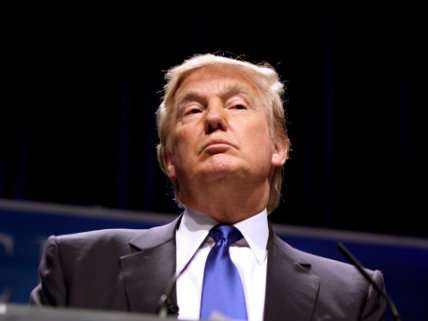It's No Surprise That Trump Might Not Accept Election Results. He's Never Accepted Democratic Norms.
The GOP candidate's personal vanity is inseparable from his authoritarian outlook.

At last night's final presidential debate, the GOP presidential nominee refused to say that he would honor and accept the results of the election. Instead, he said he would "keep you in suspense."
This is, indeed, horrifying, as his opponent Hillary Clinton said. But it should come as no surprise. It has been clear from the beginning that Trump does not accept small-d democratic norms.
In the first Republican primary debate last August, Trump, running as a Republican, refused to say that he would support the eventual nominee. That's fair enough, on its own, especially considering that several of the other GOP candidates eventually refused to do so. But it was also a warning: Trump would honor the norms of the electoral process; he would not, as a matter of course, accept its legitimacy.
The rejection of both the norms and legitimacy of democracy has been a consistent theme throughout Trump's public career. In 2012, after Barack Obama won the election, Trump went on a long twitter rant, arguing that the election was "a total sham and a travesty" and that "we are not a democracy."
Throughout the campaign, Trump has treated the norms of democracy—peace, acceptance, respect for the electoral process and for the limits of presidential power—with disdain if not outright hostility.
At his rallies, he has explicitly encouraged supporters to engage in violent acts against protesters. Since winning the nomination, he has repeatedly declared that the election is rigged, raising the specter of voter fraud that has been consistently, repeatedly proven to be almost entirely imaginary. Before that, he warned darkly that if his nomination did not go through at the Republican convention there might be riots.
Over and over again throughout his campaign, Trump has disrespected the Constitution and promised to violate its most essential rules. He has dismissed the idea of free speech, promised to seize the assets of foreign nationals, and suggested that Muslims should be forced to register in a federal database. He has repeatedly promised to order the military to commit war crimes. He has derided core constitutional principles, arguing, dismissively, that "the Constitution is not a suicide pact." Trump, who clearly does not understand the Constitution, does not believe in the sanctity of its provisions, or even in its general guidance. He believes only in his own ill-informed whims.
Trump's lack of respect for the Constitution is matched only by his praise for the strength of authoritarian dictators. He has been fulsome in his praise for Russian leader Vladimir Putin's strength, and has similarly expressed his admiration for other authoritarian leaders such as Saddam Hussan, Muammar Gaddagi, and Bashar al-Assad. At last night's debate, he repeatedly dismissed the notion, confirmed by multiple U.S. intelligence agencies, that Russia was behind the hack of democratic emails, and seemed to side with Putin for having outsmarted the United States. All the available evidence indicates that Trump is not a fan of the imperfect democracy that is the United States, but quite admires foreign authoritarians specifically for their authoritarian tendencies.
Over and over again, Trump has expressed his desire to implement authoritarian, unconstitutional policies in the U.S.—banning Muslims from entering the country, closing down Mosques, retaliating against media outlets that publish critical reports about Trump, and their owners. One of Trump's favorite lines is that "only I can solve" the problems he says ail the country.
Part of the problem is that Trump perceives himself as an eternal winner. Therefore, any loss can only be someone else's fault. That is how we ended up with a presidential debate in which Trump interrupted his opponent to declare, again, that he should have gotten an Emmy for his reality TV show, The Apprentice. Trump had insisted that the Emmy awards were also rigged against him. The man's vast personal vanity is inseperable from his authoritarian outlook.
At this point, it is hard to avoid the conclusion that Trump is not really running for president of a democratic republic; he is running to be its unchecked and unaccountable leader, free from the shackles of constitutionally limited democracy he so clearly despises.


Show Comments (167)